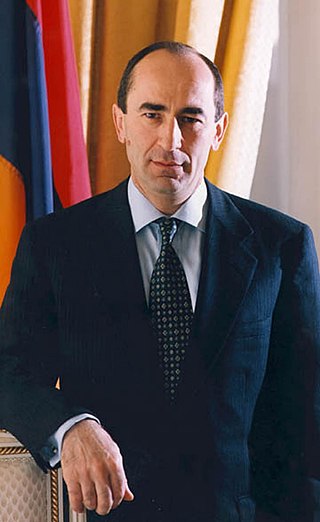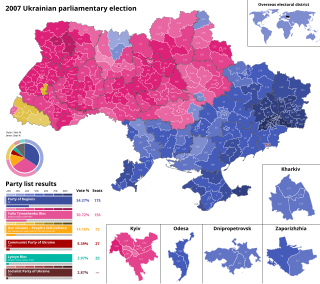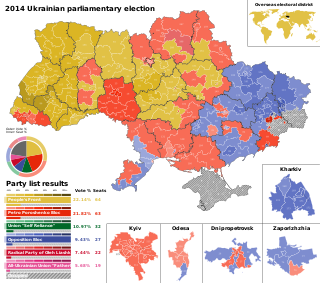 |
|---|
|
Armenia has a multi-party system. After the 2015 Armenian constitutional referendum, only a legislature is elected on the national level.
 |
|---|
|
Armenia has a multi-party system. After the 2015 Armenian constitutional referendum, only a legislature is elected on the national level.
The National Assembly consists of at least 101 seats. Following electoral system amendments introduced in April 2021, members of parliament are elected only through closed party lists by party list proportional representation method. [1] [2]
Four mandates are reserved for national minorities, provided they are included in corresponding section of party lists. Any top segment of a party list can not include over 70% of representatives of the same sex.
Parties need to pass a 5% threshold, while alliances (blocs) must pass 7% to be included in mandate distribution.
If neither party wins over 50% of mandates in the first round and no coalition with sufficient mandates is established within 6 days after the election results are announced, a second round of elections will be carried out on 28th day from the first round of voting. The two best-performing political forces are allowed to participate in the second round. All mandates received following the first round will be preserved. The party (or a newly formed coalition) which wins the second round of elections will be given additional number of mandates to reach 54% of all seats (provided the newly formed coalition does not already have over 54% of mandates from the results of the first round).
If any party or bloc wins over 2/3 of mandates, sufficient additional mandates are distributed among all other political forces represented in the parliament to ensure that at least 1/3 of all seats are held by forces other than the winning one.
Since the requirement of assignment of 1/3 of all mandates to non-ruling parties is stipulated by the Constitution, some argue, that when withdrawal of oppositional MPs leads to violation of that rule, the ruling party shall be forced to call new snap elections. This is however, not a consensus opinion and could be dealt with in Constitutional Court. [3]
Due to additional seats given either to the winning political force or other ones, the total number of seats in the National Assembly can grow above the minimal count and even exceed 200 in rare circumstances. [4]
The next Armenian parliamentary election is scheduled to occur in 2026.
The electoral threshold, or election threshold, is the minimum share of all the votes cast that a candidate or political party requires to achieve before they become entitled to representation or additional seats in a legislature. This limit can operate in various ways, e.g. in party-list proportional representation systems where an electoral threshold requires that a party must receive a specified minimum percentage of votes, either nationally or in a particular electoral district, to obtain seats in the legislature. In Single transferable voting the election threshold is called the quota and it is possible to pass it by use of first choice votes alone or by a combination of first choice votes and votes transferred from other candidates based on lower preferences. In mixed-member-proportional (MMP) systems the election threshold determines which parties are eligible for top-up seats in the legislative body.

Robert Sedraki Kocharyan is an Armenian politician. He served as the President of the Nagorno-Karabakh Republic from 1994 to 1997 and Prime Minister of Nagorno-Karabakh from 1992 to 1994. He served as the second President of Armenia between 1998 and 2008 and as Prime Minister of Armenia from 1997 to 1998.

The Republican Party of Armenia is a national-conservative political party in Armenia led by the third president of Armenia, Serzh Sargsyan.

The Hanrapetutyun Party is a pro-European political party in Armenia. The party was founded by ex-members from the Republican Party of Armenia and members of the Yerkrapah Volunteer Union: Aram Sargsyan, Albert Bazeyan, Vagharshak Harutiunyan, Ara Ketikyan, among others, in April 2001.

Parliamentary elections were held in Ukraine on 26 March 2006. Election campaigning officially began on 7 July 2005. Between November 26 and 31 December 2005 party lists of candidates were formed.

The National Assembly of Armenia, also informally referred to as the Parliament of Armenia is the legislative branch of the government of Armenia.

Early parliamentary elections were held in Ukraine on 30 September 2007. The election date was determined following agreement between the President Viktor Yushchenko, the Prime Minister Viktor Yanukovych and the Chairman of the Verkhovna Rada Oleksandr Moroz on 27 May 2007, in an attempt to resolve the political crisis in Ukraine triggered by the 2 April 2007 presidential decree on dissolution of Ukraine's parliament.
The Armenian National Congress is an Armenian political party led by former president Levon Ter-Petrosyan and was formed in 2008. Its direct predecessor was the Pan-Armenian National Movement. It is often abbreviated as ՀԱԿ or HAK, in keeping with its Armenian spelling, but it is occasionally referred to as the ANC in English, including on its official website.

Parliamentary elections were held in Egypt from 28 November 2011 to 11 January 2012, following the revolution that ousted President Hosni Mubarak, after which the Supreme Council of the Armed Forces (SCAF) dissolved Parliament. However the dissolution was ruled unconstitutional and Parliament was reinstated. Originally, the elections had been scheduled to be held in September 2011, but were postponed amid concerns that established parties would gain undue advantage.

Parliamentary elections were held in Armenia on 6 May 2012. President Serzh Sargsyan's ruling Republican Party gained more majority of the parliament seats. Armenia's wealthiest man Gagik Tsarukyan's Prosperous Armenia came second with about one fourth of the seats, while ANC, ARF, Rule of Law and Heritage won less than 10 percent each.

Parliamentary elections were held in Armenia on 2 April 2017. They were the first elections after a constitutional referendum in 2015 that approved reforms for the country to become a parliamentary republic. The result was a victory for the ruling Republican Party of Armenia, which won 58 of the 105 seats in the National Assembly.

Snap parliamentary elections were held in Ukraine on 26 October 2014 to elect members of the Verkhovna Rada. President Petro Poroshenko had pressed for early parliamentary elections since his victory in the presidential elections in May. The July breakup of the ruling coalition gave him the right to dissolve the parliament, so on 25 August 2014 he announced the early election.

Parliamentary elections were held in Georgia on 31 October and 21 November 2020 to elect the 150 members of Parliament. The ruling Georgian Dream party led by Prime Minister Giorgi Gakharia won re-election for a third term in office, making it the first party in Georgian history to do so. The elections also saw a record number of opposition parties elected to parliament.

The Way Out Alliance or Yelk Alliance or simply Yelk or Way Out was a liberal political alliance of three political parties in Armenia: Civil Contract, Bright Armenia and the Hanrapetutyun Party. It was formed on 12 December 2016, before the 2017 Armenian parliamentary election. Its leaders were Edmon Marukyan, Nikol Pashinyan, and Aram Sargsyan. The alliance was dissolved on 12 September 2018 after its constituent parties agreed to participate in the 2018 parliamentary elections separately.

Snap parliamentary elections were held in Armenia on 9 December 2018, as none of the parties in the National Assembly were able to put forward and then elect a candidate for Prime Minister in the two-week period following the resignation of incumbent Prime Minister Nikol Pashinyan on 16 October. They were the first elections after the 2018 revolution and the country's first-ever snap elections.
Yerevan City Council elections were held on 23 September 2018. The snap election was trigged after the resignation of former mayor Taron Margaryan amid the aftermath of the 2018 Armenian Velvet Revolution. Well-known comedian and actor Hayk Marutyan, heading the electoral list of the My Step Alliance, was elected to the office of mayor of Yerevan.

Snap parliamentary elections were held in Armenia on 20 June 2021. The elections had initially been scheduled for 9 December 2023, but were called earlier due to a political crisis following the 2020 Nagorno-Karabakh War and an alleged attempted coup in February 2021.

The My Step Alliance was a political alliance in Armenia formed by the Civil Contract party, the Mission Party and various independent representatives of civil society. It was formed in August 2018, before the 2018 Yerevan City Council election. The leader of the alliance was the Prime Minister of Armenia Nikol Pashinyan. Despite its dissolution as a national party in May 2021, the My Step Alliance operated in the Yerevan City Council until the end of its mandate in September 2023.

Snap parliamentary elections were held in Moldova on 11 July 2021. Following the resignation of Ion Chicu, the position of Prime Minister became vacant, with the Parliament being obligated to form a new government within three months. After the expiration of the constitutionally mandated period and two failed attempts to win parliamentary approval for the proposed cabinets, the Constitutional Court ruled on 15 April that the circumstances justifying a dissolution of the parliament were met. President Maia Sandu signed the decree dissolving the Parliament on 28 April and snap parliamentary elections were called on.
Yerevan City Council elections were held on 17 September 2023. The Yerevan City Council comprises 65 members, including the mayor and the first deputy mayor, elected through a proportional electoral system. City Council members are elected for a five-year term.